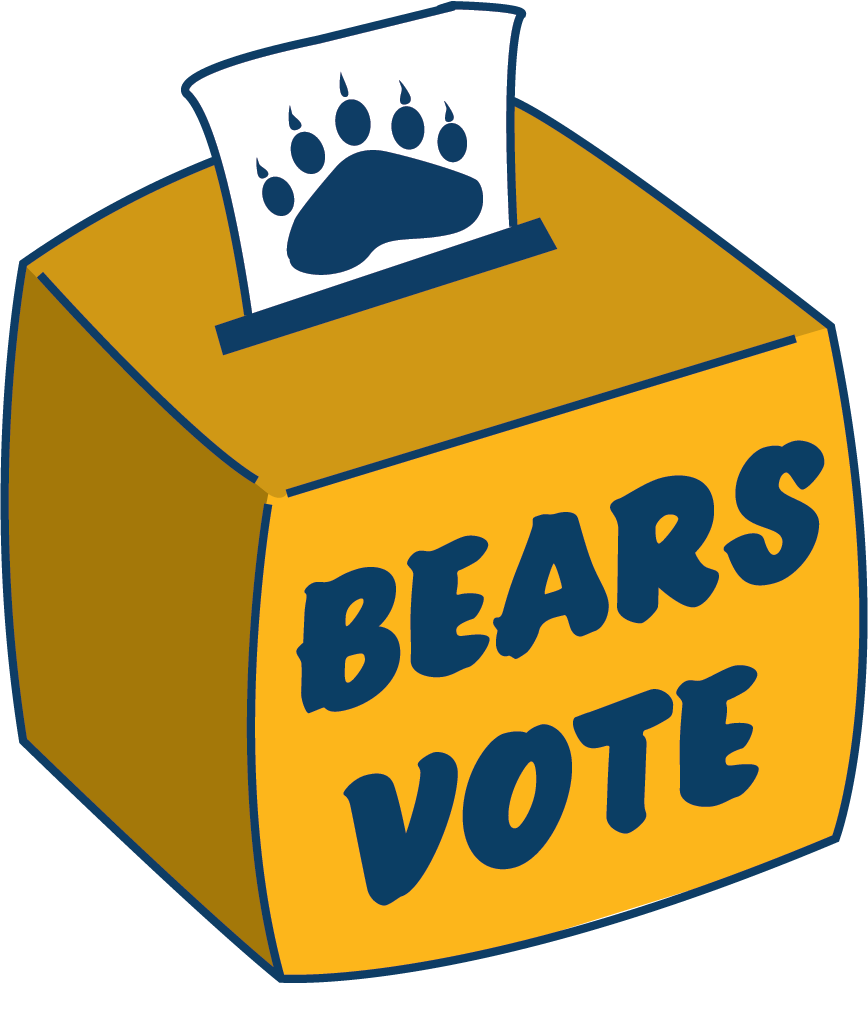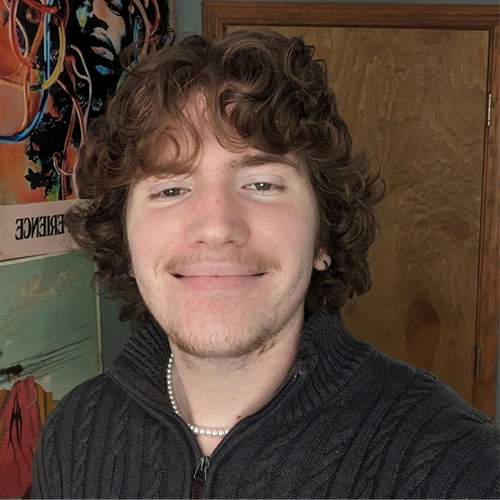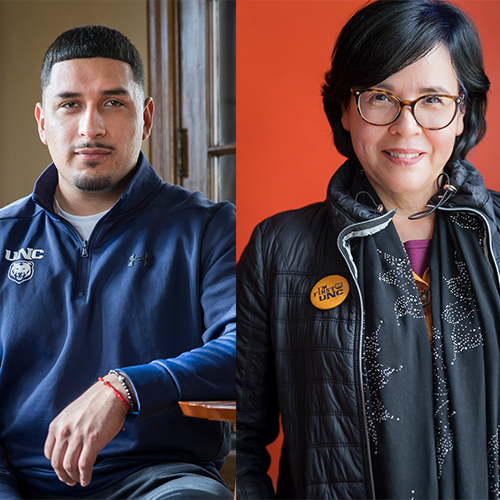
With presidential election right around the corner it is vital for all students to get out there and register to vote. Listen to our new host Andrew Galster talk with Julia Martin from Bears Vote Coalition and Joseph Kusluch Assistant Professor of Political Science and International Affairs talk about the relevance of voting. (Running time: 14:50)
Andrew: Welcome back to Bear in Mind. My name is Andrew Galster and as you might remember,
I have the privilege of being your host for season four. The great Katie Nord last
year's host gave me a lot to work with going forward. So I hope to keep some of the
things that she established the same, while also adding a little bit of my own personality
into the mix. But who am I? What will I bring? Like all my predecessors, I'm a member
of the journalism program here at UNC, but I'm also enrolled in the Political Science
major here on campus. I hope to bring that perspective to this podcast in the future
and still do all the fun stuff you guys are accustomed to. Jumping right into that
though, with the election right around the corner, it is vital for all students to
get out there and register to vote. In the words of the Great Franklin Roosevelt,
democracy cannot succeed unless those who express their choice are prepared to do
so wisely. The real safeguard of democracy, therefore is education. To give us a picture
of what this looks like, I have Julia Martin and Professor Joseph Kusluch in the studio
with me today.
Julia: My name is Julia Martin. I am a senior here at the University of Northern Colorado.
I major in political science and legal studies and I also have my human resources
certificate and I'm also an intern for Bears Vote.
Kusluch: Yeah, so my name's Dr. Joseph Kusluch. I'm an assistant professor of Political science
and International Affairs here at UNC. I really teach courses across the political
science spectrum from American government, international relations to comparative
politics. So if there's a field of political science, I probably teach a course in
that.
Andrew: Julia, Kusluch. Thank you for being with me here today
Julia: <laughs>. Thanks for having me.
Kusluch: Thanks for having me.
Andrew: Guys, why vote?
Julia: Yeah, it's your civic duty of course, but it ensures the democracy happens because
without participation then there is no like actual democracy happening.
Kusluch: Yeah, absolutely. I think it's important to make sure that all of us in a democracy
make sure our voices are heard. Even if you're in a safe, state where you might think
your vote doesn't count, it's still worth voting and there are plenty of down ballots
and other elections beyond the president that is worth voting for.
Andrew: How does the voting process work here in Greeley?
Kusluch: I think that for like registering to vote, it's really the same across the state.
The easiest way to register to vote is online. You can register to vote in Colorado
online and if you do it eight days in advance of the election, they'll send you the
ballot and then you can just fill in your ballot and you can drop it off, send it
back.
Julia: But Colorado's also a same state registration state, so if you can't vote by mail
you can still go into the polling place and register.
Kusluch: Yeah, so you can just show up the day of voting and register to vote and then you
can vote that day, which is nice. Many states don't allow same day registration, so
it's nice that you can have that opportunity.
Julia: For quite a few states. Registration ends October 7th.
Kusluch: But here in Colorado we are fortunate enough that if you maybe missed a deadline,
if you didn't think about it in advance, now that we're in the election season, that
you can still register the same day and that's a nice opportunity.
Andrew: What does that registration process look like after you're online?
Julia: So it does vary by state, but the easiest way is to go to vote.org and it'll take
you to your state's secretary and that's where you'll register to vote. You need your
driver's license, kind of the easiest way to do it. It has all the information you
really need, but yeah, you just go on there and fill out all your information.
Kusluch: Super easy. I think it only takes a couple minutes. When I moved to Colorado a couple
years ago, I changed my voting registration. Super easy, user friendly, self-explanatory.
You can get registered to vote, make sure your voice is heard.
Andrew: So what is the Bears Vote Coalition?
Julia: We're working to get people registered to vote and voter education. We want you to
all vote of course. So we were just trying to help you get all the stuff taken care
of so you can.
Andrew: Have you been having fun on Bears Vote? Has it been a good time so far?
Julia: I have been, been really busy <laugh>,
Andrew: I can imagine.
Julia: I'm going to another tailgate tomorrow, <laugh> <laugh>. But no, it's a lot of fun.
We've been hosting some fun events October 15th and 22nd. We're doing some trivia
nights with the UPC and yeah, we've been just having fun with like putting stuff together
but also just chatting with people like I love talking to people from out of state
about what, how their voter registration works or how it looks for them.
Andrew: What exactly is your role on the Bears Vote Coalition?
Julia: So I'm one of the interns and so what I've been doing since about April is putting
together different events, brainstorming how to advertise and get people registered
to vote. Kind of designing a few things, just kind of getting stuff together to advertise
and like help students figure out how to register to vote and figuring out like how
we do get students registered to vote.
Andrew: Cool. In that same vein, if there was a student on campus that wanted to go out and
vote, how could they do that and is there options for that on campus?
Julia: Absolutely. So on polling day there will be, I believe it's in the CC or the campus
comments if you're, dunno what that abbreviation is yet. <laugh>,
Andrew: If you don't actually go here <laugh>
Julia: <laugh>. If they wanna get involved with Bears vote, they're absolutely welcome to
participate on October 1st, we are watching the vice presidential debate. So if students
do wanna go out and vote, they can have, there's polling on campus, they could also
find their mailing ballot <laugh> or they can just chat with me and I can also help
them work with us as well.
Andrew: That's super cool. I didn't know Bearsville Coalition was offering so many opportunities.
What resources are there for students who want to vote but don't know how to on campus?
Julia: So the biggest is vote.org. It not only has the links for you to register to vote,
it also has the links for to order your absentee ballot if you are out of state or
check your registration status. And it has some other information on there as well
for all 50 states. It's not just Colorado and I think that's just kinda the biggest
resource. But we also are open and we love and when people ask us questions we are
happy to help. I don't think there's been a question yet that we haven't been able
to figure out for somebody, but yeah.
Andrew: So you guys are pros is what you're saying <laugh>
Julia: Try to be, yeah.
Andrew: I feel like you should, you know, hype yourself up a little bit. <laugh>, it sounds
like you guys know what you're doing. UNC has a long history of students going out
and voting UNC received platinum for 2018 and 2020 and Gold for 2022. In the all in
campus Democracy challenge. A challenge based on amount of students who vote on campus.
How do you guys make sure that happens?
Julia: We actually work with Big Sky, which is, as you all know, what our D 1 team league
<laugh> is a part of. That's the organization we work through. It's kind of a competition
almost with the other schools to get 80%. But our goal this year, 'cause we've met
it last election, not last presidential election. So this goal is 85% registered to
vote and to vote of course. But there's also, you know, things that happen sometimes
like I'm praying I get my ballot in time. <laugh>. Yeah. But yeah, no, we will help
out students, we'll help 'em get registered to vote and just, you know, get them all
set to go.
Andrew: If we could, we could play a little quick game. I'm going to ask you a question and
I'm hoping you can answer with a yes or a no. Okay. And I'm hoping we can do this
in a rapid-fire pace.
Julia: Okay.
Andrew: Okay. Are you ready?
Julia: Yes.
Andrew: Competitor number one, can I vote if I have a disability?
Julia: Yes
Andrew: If I'm currently unhoused?
Julia: Yes
Andrew: In an active military?
Julia: Yes
Andrew: If I'm living overseas?
Julia: Yes
Andrew: You were ready. I'm sorry, <laugh>, I should never have doubted you. <laugh>. What
are some of the goals for the Bears Vote Coalition?
Julia: So as I said, we are trying to get 85% of students on campus registered to vote, but
mainly our goal is voter education. So that's why we're also hosting some different
events. We have one coming up on October 23rd hosted by Dr. Allen. She is leading
an educational kind of like workshop talking about the United States v Trump case,
talking about what that looks like. And those like cases like that are to just kind
of educate people like what the Supreme Court does and like the ramifications of who
you vote for. And not necessarily saying that every ramification is bad, but just
like understanding that like when you vote for president, you also might be voting
for a Supreme Court or for other different actions to take place.
Andrew:
And when did you say that was?
Julia:
October 23rd.
Andrew:
Super cool. So I encourage people to go to that. Why do you think voting amongst students
is so important?
Kusluch:
We see that when we look at what demographic, what age group votes the least, it is
oftentimes the younger generation and then we see that their voice isn't always heard
as much in public policy making. So, it is important for students to make sure their
voice is heard. We saw even in the 2016 election, only about 48% of college students
nationwide voted that's not, that is below the, the national average of about 61%.
We know in the past couple elections have been higher turnouts than previously, but
that's still not a fantastic number when it comes to something as important as voting
in a democracy of making sure your voice is heard. So I think it's important for students,
for young people to get out and make sure their voice is heard. So public policy better
represents their interests than maybe other groups that are more reliable voters.
Andrew:
Do our votes as young college students matter if we were to go vote?
Kusluch:
Absolutely every, every vote matters. Making sure your voice is heard, making sure
that representatives would be representatives. Understand that young people are a
voting block that is going to consistently come out is important to make sure that
they understand young people will come out and vote and you should pay attention to
young people in public policy should be geared towards making young people's lives
better. So your vote will absolutely count. And we sometimes hear people say, I don't
think my vote counts. Or they get discouraged when it may be public policy isn't going
in the direction they want, but you have to just consistently vote and make sure that
your voice is heard and representatives know that you are engaged and in democratic
system. So I think it is absolutely important to vote and I absolutely would say your
vote does matter.
Andrew:
What do you teach your students about voting?
Kusluch:
We spend a lot of time thinking about our role as citizens in a democracy. And really
the easiest way to be engaged in a democracy is to make sure you vote. So we spend
a lot of time thinking about our responsibilities as citizens in a democratic system.
We know young people are a large voting block, students are a large voting block.
So we talk about public policies that students would like to see and how you achieve
those. One of the easiest ways is making sure you vote, making sure that you go out
in large numbers, make sure your voice is heard because you can shape public policy.
We see some close elections where only maybe a hundred or 150, 200 votes are the difference.
If you go out and vote, if enough of you and your friends go out and vote, that can
absolutely make a difference.
Andrew:
That’s a crazy small number. That's terrifying almost. Yeah,
Kusluch:
We saw, even here in Colorado, we had a election last cycle where the candidate only
won by a little over 500 votes. So every vote, every vote matters. And if you want
to make your voice heard in a democracy, go out and vote.
Andrew:
This to me is the most interesting. And I think something you can give me a lot of
insight in knowing what we talk about in class. What happens if as a society we don't
go vote? Are there any examples of this?
Kusluch:
When I talk to my students about what happens if you don't vote, one thing they tell
me is then someone else is going to be making these decisions for you. There will
always be decisions about how government spending occurs. There will always be decisions
about healthcare policy, always be decisions about reproductive rights. And if you're
not involved, if you're not making your voice heard, someone else will be making those
decisions for you. And we see that. We see where maybe young people sit out from voting
and then public policy isn't directed towards that.
Andrew:
Gotcha. So moral of the story, go vote. It's easy and it represents you. Yeah,
Kusluch:
Absolutely. In, like I said at the outset in Colorado, you can register to vote online,
they'll send you a ballot. I vote. I've moved around quite a bit in life, and this
is one of the easiest states to vote in. So many roadblocks that exist in other states
are not here in Colorado. So, if you're a Colorado resident, you can register online
as long as it's eight days in advance, or you can do same-day voter registration and
you can make sure your voice is heard.
Andrew:
Cool. Do you have any last notes you want to tell a potential audience?
Kusluch:
No, just just the importance of voting. We know over the last two elections there
has been an A, an increase in young people voting of students voting, making sure
their voice is heard. And so I think that's a good trajectory. I suspect this election
is going to hold true as well, that more and more young people will come out and vote.
And I do want to stress that it's not, you're not just voting for the president, you're
also voting for local candidates. You're voting for ballot initiatives and many states
around the country this November, there are important ballot initiatives. So if you're
not a Colorado resident, you might vote for some pretty important ballot initiatives.
And here in Colorado there are not only ballot initiatives, the presidential race,
but also down ballot races that you should make sure your voice is heard on. Oftentimes
when we think of elections and voting, maybe we think of just the presidential race.
You're also voting for other representatives down ballot, which is also important
to make sure your voice is heard for,
Julia:
Get registered to vote <laugh>. And for other events and information you can follow
us on Instagram.
Andrew:
Cool. Thank you guys for joining me today. Hopefully, you guys learned a little bit
more about what it means to vote, why you should go do it, and how you can go do it
here on campus. I really appreciate you taking the time, listening to my first episode,
and I hope you tune back in with us next time where we talk about free speech and
what that means. Thanks for listening and I'll catch you next time.



